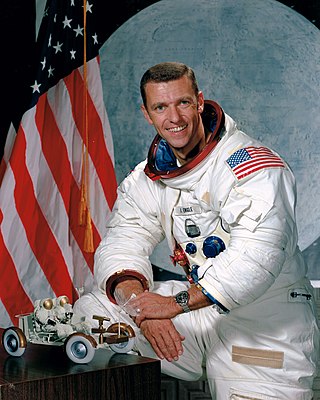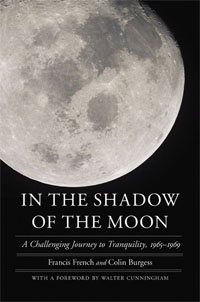
Apollo 7 was the first crewed flight in NASA's Apollo program, and saw the resumption of human spaceflight by the agency after the fire that had killed the three Apollo 1 astronauts during a launch rehearsal test on January 27, 1967. The Apollo 7 crew was commanded by Walter M. Schirra, with command module pilot Donn F. Eisele and lunar module pilot R. Walter Cunningham.

Alan LaVern Bean was an American naval officer and aviator, aeronautical engineer, test pilot, NASA astronaut and painter. He was selected to become an astronaut by NASA in 1963 as part of Astronaut Group 3, and was the fourth person to walk on the Moon.

James Benson "Jim" Irwin was an American astronaut, aeronautical engineer, test pilot, and a United States Air Force pilot. He served as Lunar Module pilot for Apollo 15, the fourth human lunar landing. He was the 8th person to walk on the Moon and the first, and youngest, of those astronauts to die.

David Randolph Scott is an American retired test pilot and NASA astronaut who was the seventh person to walk on the Moon. Selected as part of the third group of astronauts in 1963, Scott flew to space three times and commanded Apollo 15, the fourth lunar landing; he is one of four surviving Moon walkers and the only living commander of a spacecraft that landed on the Moon.

Walter Marty Schirra Jr. was an American naval aviator, test pilot, and NASA astronaut. In 1959, he became one of the original seven astronauts chosen for Project Mercury, which was the United States' first effort to put humans into space. On October 3, 1962, he flew the six-orbit, nine-hour, Mercury-Atlas 8 mission, in a spacecraft he nicknamed Sigma 7, becoming the fifth American and ninth human to travel into space. In December 1965, as part of the two-man Gemini program, he achieved the first space rendezvous, station-keeping his Gemini 6A spacecraft within 1 foot (30 cm) of the sister Gemini 7 spacecraft. In October 1968, he commanded Apollo 7, an 11-day low Earth orbit shakedown test of the three-man Apollo Command/Service Module and the first crewed launch for the Apollo program.

Joe Henry Engle is an American pilot, aeronautical engineer and former NASA astronaut. He was the commander of two Space Shuttle missions including STS-2 in 1981, the program's second orbital flight. He also flew two flights in the Shuttle program's 1977 Approach and Landing Tests. Engle is one of twelve pilots who flew the North American X-15, an experimental spaceplane jointly operated by the Air Force and NASA, and the last surviving test pilot of the aircraft. After Richard H. Truly died in 2024, Engle is now the last surviving crew member of STS-2.

Ronnie Walter Cunningham was an American astronaut, fighter pilot, physicist, entrepreneur, venture capitalist, and author of the 1977 book The All-American Boys. NASA's third civilian astronaut, he was a lunar module pilot on the Apollo 7 mission in 1968.

Donn Fulton Eisele was a United States Air Force officer, test pilot, and later a NASA astronaut. He served as command module pilot for the Apollo 7 mission in 1968. After retiring from both NASA and the Air Force in 1972, he became the Peace Corps country director for Thailand, before moving into private business.

Richard Francis "Dick" Gordon Jr. was an American naval officer and aviator, test pilot, and NASA astronaut, and a football executive. He was one of 24 people to have flown to the Moon, as command module pilot of the Apollo 12 mission, which orbited the Moon 45 times. Gordon had already flown in space as the pilot of the 1966 Gemini 11 mission.

Thomas Patten Stafford was an American Air Force officer, test pilot, and NASA astronaut, and one of 24 astronauts who flew to the Moon. He also served as Chief of the Astronaut Office from 1969 to 1971.

Alfred Merrill Worden was an American test pilot, engineer and NASA astronaut who was command module pilot for the Apollo 15 lunar mission in 1971. One of 24 people to have flown to the Moon, he orbited it 74 times in the command module (CM) Endeavour.

Voyage is a 1996 hard science fiction novel by British author Stephen Baxter. The book depicts a crewed mission to Mars as it might have been in another timeline, one where John F. Kennedy survived the assassination attempt on him on 22 November 1963. Voyage won a Sidewise Award for Alternate History, and was nominated for the Arthur C. Clarke Award in 1997.

The Apollo 15 postal covers incident, a 1972 NASA scandal, involved the astronauts of Apollo 15, who carried about 400 unauthorized postal covers into space and to the Moon's surface on the Lunar Module Falcon. Some of the envelopes were sold at high prices by West German stamp dealer Hermann Sieger, and are known as "Sieger covers". The crew of Apollo 15—David Scott, Alfred Worden, and James Irwin—agreed to take payments for carrying the covers; though they returned the money, they were reprimanded by NASA. Amid much press coverage of the incident, the astronauts were called before a closed session of a Senate committee and never flew in space again.

The United States Astronaut Hall of Fame, located inside the Kennedy Space Center Visitor Complex Heroes & Legends building on Merritt Island, Florida, honors American astronauts and features the world's largest collection of their personal memorabilia, focusing on those astronauts who have been inducted into the Hall. Exhibits include Wally Schirra's Sigma 7 space capsule from the fifth crewed Mercury mission and the Gemini IX spacecraft flown by Gene Cernan and Thomas P. Stafford in 1966.
Colin Burgess is an Australian author and historian, specializing in space flight and military history. He is a former customer service manager for Qantas Airways, and a regular contributor to the collectSPACE online community. He lives in New South Wales.

In the Shadow of the Moon: A Challenging Journey to Tranquility is a 2007 non-fiction book by space historians Francis French and Colin Burgess. Drawing on a number of original personal interviews with astronauts, cosmonauts and those who worked closely with them, the book chronicles the American and Soviet programs from 1965 onwards, through the Gemini, Soyuz and early Apollo flights, up to the first landing on the Moon by Apollo 11.
The Eugene M. Emme Award is an award given annually to a person or persons selected by a panel of reviewers from the American Astronautical Society History Committee to recognize "the truly outstanding book published each year serving public understanding about the positive impact of astronautics upon society." The award is in honor of Eugene M. Emme, NASA's first historian.
Into That Silent Sea: Trailblazers of the Space Era 1961–1965 is a 2007 non-fiction book by space historians Francis French and Colin Burgess. Drawing on a number of original personal interviews with astronauts, cosmonauts and those who worked closely with them, the book chronicles the American and Russian programs from 1961 onwards, from the first human spaceflight of Yuri Gagarin through the Mercury, Vostok and Voskhod flights, up to the first spacewalk by Alexei Leonov.

The Personal Preference Kit (PPK) is a container used to carry the personal items of astronauts during the Gemini, Apollo, Space Shuttle, and International Space Station programs. Items that astronauts choose to carry into space are approved by NASA management and stored in PPKs. Information on the contents of kits are usually kept private by the astronaut, although some contents have been put on display or given as awards to contributors to space programs.
















